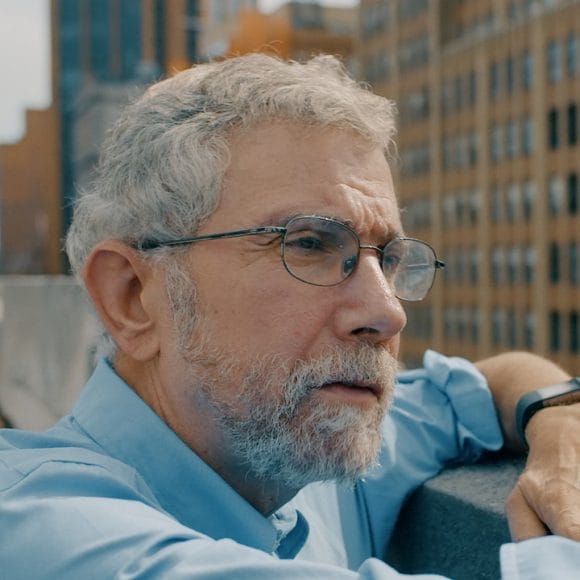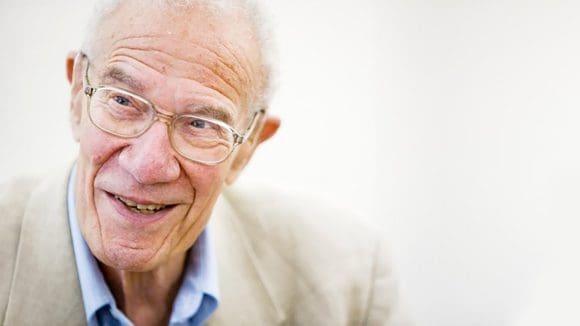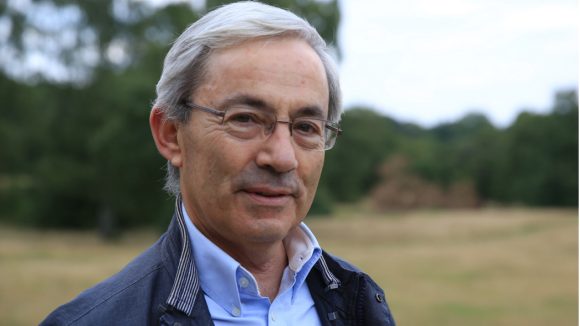Paul Krugman
Nobel 2008 | How can we reduce inequality?
Paul Krugman needs no introduction. Probably the most famous economist alive, he’s also a noted policy advisor, opinion columnist and blogger for The New York Times. His cutting-edge research revolutionized the way we think about international trade and industry localities. His work initially won him the John Bates Clark Medal, awarded annually to a US economist under the age of 40. Winning the Nobel Prize was only a matter of time.

Paul R. Krugman
Paul R. Krugman
Sveriges Riksbank Prize in Economic Sciences in Memory of Alfred Nobel, 2008
At a glance
Born: 1953, New York, USA
Field: International and regional economics
Prize-winning work: Analysis of trade patterns and location of economic activity
Music lover: He might be the only man without a topknot at Brooklyn gigs
What makes him uneasy: Being recognized on the street
A living legend with energy to spare
A living legend with energy to spare
Early in the morning, Krugman appears in the corridor of the CUNY Graduate Center. His gait is firm and energetic, his expression focused, without a trace of frequent traveler’s fatigue. In his soft voice, shyly but directly, Krugman briefly runs us through his schedule. He’s just arrived from an advisory trip overseas and is preparing for a conference on inequality the next day.
How did Paul Krugman become “The Voice of the Left”?
How did Paul Krugman become “The Voice of the Left”?
"Everybody who does international economics, and tries to do both analysis and policies, has to be not-quite-human in some dimension," says Krugman in his mildly sarcastic New York tone. The economist walks us down memory lane, to his graduate school days, revealing that his advisor and mentor, economist Rudi Dornbusch, could make do with just three to four hours sleep a night. Krugman admits he needs his shuteye, but he has his own strategy for keeping up. "I’m a very, very fast, organized writer."
Krugman gained popularity among millions of readers for his critical The New York Times column, which won him the moniker "The voice of the left." In his minimalist writing style, Krugman explains complex economic concepts, making them resonate with a wide array of readers who don’t necessarily have economics degrees. His words, which grace "the best journalistic real estate in the world" reach a massive international readership.
How does Paul Krugman have such a wide audience?
Has this question inspired you?
Has this question inspired you?
Get the latest Nobel perspectives delivered to you.
Why does Krugman challenge conventional wisdom and expose the preferences of the ruling elites?
Why does Krugman challenge conventional wisdom and expose the preferences of the ruling elites?
Krugman’s opinion pieces take on the ruling elites, the one percent and the climate change deniers. He challenges viewpoints frequently found in academic and journalistic writing.
Often, conventional wisdom is not actually supported by the evidence. And if you ask where conventional wisdom comes from, it very heavily tends to reflect the preferences and interests of the elite.
The Nobel Laureate uses the conflicting preferences of the elite, in contrast with those of the masses to illustrate this point. "The general public would like to see welfare and social insurance programs strengthened, not cut back,” he says. “The elite would like to see them cut back. Then you ask, where is the conventional wisdom? It’s that the deficit is a terrible problem and we must cut back on entitlement programs."
He says people come to understand a status quo, not because it’s what voters want, but because it’s the interest of the elite.
What is the divisive debate between austerity and deficit?
What is the divisive debate between austerity and deficit?
Austerity versus a growing deficit is a divisive topic among economists and Krugman illustrates this with an example. "France has been pretty diligent about trying to reduce its budget deficit, almost too much so,” he says. “France being where it is, having the policy that it does, did it by trying to raise taxes on the wealthy, rather than cutting social programs. And there are a lot of people in the European commission saying ‘Oh no, that’s not right, that’s not what we call austerity.’ Which gave the game away. If you’re saying ‘It’s only austerity if you make poor people suffer, that’s showing what it’s really all about."
When is austerity a friend and when is it a foe?
How did Krugman's career in economics take shape?
How did Krugman's career in economics take shape?
As we continue the conversation about his award-winning research, the 2008 Laureate’s portrait begins to take shape. Take his legacy of robust economic modeling from MIT, where he earned a PhD in 1977 and became a professor. Add to this his talent for clear, concise writing and this is Krugman. He feels that the melting pot of immigrant that is New York has helped shape his approach towards economics.
Krugman considers his career a lucky accident of being in the right place at the right time. A humble view considering he’s done significant work in all the right times and places. Take for instance his work for the US government.
People are always shocked when they find out I worked in the Reagan administration.
He was 29 when he was appointed senior international economist alongside Harvard University president Emeritus Larry Summers, then a senior domestic economist. As a Democrat in the Republican administration, the young economist saw the job as an opportunity to gain a deeper understanding of the way things work in the economy and the government.
Has this question inspired you?
Has this question inspired you?
Get the latest Nobel perspectives delivered to you.
What makes Krugman's work in international trade theory unique?
What makes Krugman's work in international trade theory unique?
Krugman’s work is a unique blend of substance and style. He developed a theory based on the insights of a single case, rather than broader generalizations. He used the simplest model possible to grasp the essence of the theory. As for substance, his focus on the idea of increasing returns in international trade, draws from the works of economics forefathers Adam Smith and David Ricardo.
"When I think about the state of international trade theory before about 1980, there’s an old joke about a drunk who dropped his keys and searches for them under a lamppost,” he says. “Someone passes and asks ‘Did you drop your keys here?’ and he says ‘No, I dropped them in the alley, but I can’t see there, so I’m looking here, where there’s enough light.’"
"The older theories assumed that there was perfect competition," he continues. "That there were no advantages to large scale production, and the reason to assume this was that we knew how to model that, we knew how to do the analysis. It was simple economics."
Why should we be asking the right questions and challenging conventional wisdom in international trade?
Nearly everyone avoided dealing with the complications of modeling increasing returns, which included the possibility of multiple equilibria, as well as transforming a static model into a dynamic one. The economist talks of his groundbreaking work rather matter-of-factly. "The work that I got the prize for was very largely about finding an intersection between newly available analytical tools and the corresponding real world issues,” he says. “I didn’t start with an issue and then try to find a way to analyze it. I started mostly with a tool and discovered the issue to which it applies."
What are the potential solutions to reducing inequality and can there be negative consequences on the economy?
What are the potential solutions to reducing inequality and can there be negative consequences on the economy?
Krugman started working on the problem of reducing inequality as an intellectual civilian, rather than approaching it from a purely academic position. "There are things that we know we can do and there are things that we think we can do,” he says. “And we should be doing all of them. Redistribution, taxes and transfers, guarantee of basic income in some form for the less fortunate, paid for by taxes on the most fortunate. We can do that. But we know that there’s a wide range of how much is done and there’s no evidence that countries that do more pay any real price."
Can we design policies so people can live better lives?
While there’s no universal cure for the world’s problems, Krugman believes many of the issues facing the world can be addressed with relevant economic tools and solutions. What’s lacking, however, is the political will to solve them. This is precisely how Krugman sees the biggest challenge in his mind, climate change.
Why do we even talk about anything other than climate change? The problem is, we have a combination of denial and the problem of which country bears the burden. That dominates everything else.
What is Krugman's approach to storytelling and how did it develop?
Be it for an academic audience or for the general public, Krugman always finds a way to tell a story. Early in his childhood and adolescence, he cultivated a passion for history and sci-fi novels. From this emerged a desire to tell stories about people, the way they interact with one another and what results from it.
Economics is a social science about what people do and how it turns out. And that means that you’re telling a story, a narrative about people, even if you’re doing it in a very stylized way.
How can we apply Paul Krugman’s theories to the current realities?
Why do countries have to find better ways to grow?
Why do countries have to find better ways to grow?
Hear Michael Spence's view on how countries can grow sustainably while having a long-lasting positive impact.
Has this question inspired you?
Has this question inspired you?
Get the latest Nobel Perspectives updates delivered to you.



